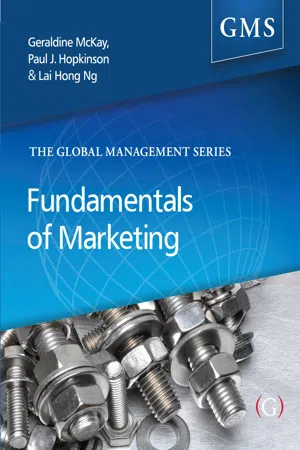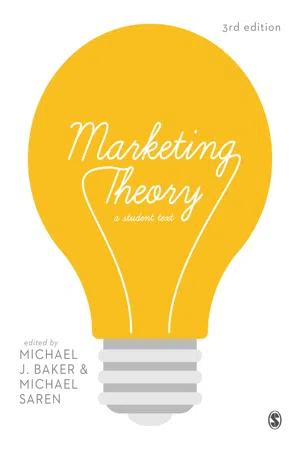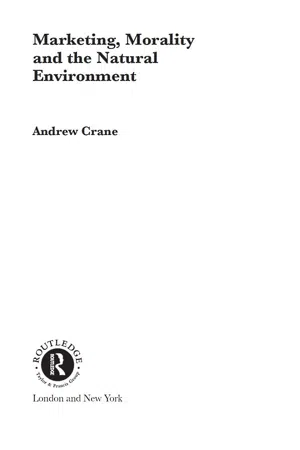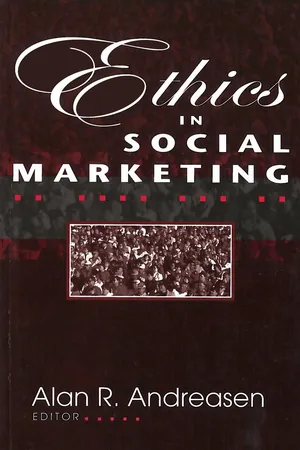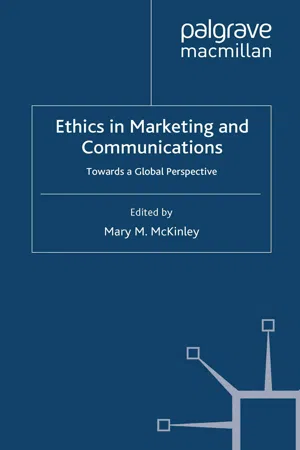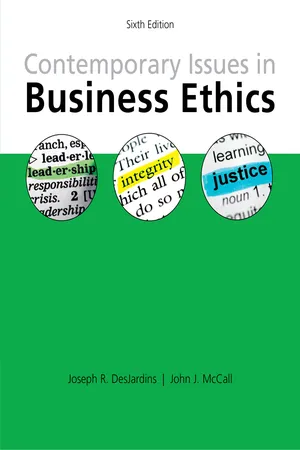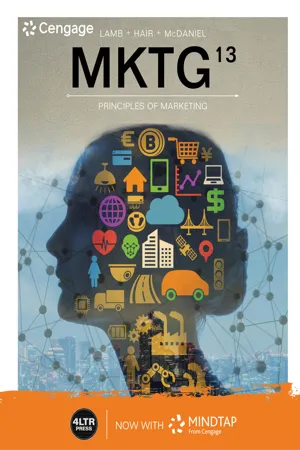Marketing
Ethics in Marketing
Ethics in marketing refers to the moral principles and standards that guide the conduct of marketing activities. It involves ensuring that marketing practices are fair, honest, and transparent, and that they do not harm individuals or society. Ethical marketing also encompasses respecting consumer privacy, promoting diversity and inclusion, and being environmentally responsible.
Written by Perlego with AI-assistance
Related key terms
1 of 5
12 Key excerpts on "Ethics in Marketing"
- eBook - PDF
- O. C. Ferrell, Michael Hartline, O. C. Ferrell, Michael Hartline, Bryan Hochstein(Authors)
- 2021(Publication Date)
- Cengage Learning EMEA(Publisher)
The most basic of these principles have been codified as laws and regulations to induce marketers to conform to society’s expectations of conduct. However, it is important to understand that marketing ethics goes beyond legal issues: Ethical marketing decisions foster trust, which helps build long-term marketing relationships. Marketing ethics includes decisions about what is right or wrong in the organizational context of planning and implementing marketing activities in a global business en- vironment to benefit (1) organizational performance, (2) individual achievement in a work group, (3) social acceptance and advancement in the organization, and (4) stakeholders. This definition of marketing ethics recognizes that ethical decisions occur in a complex social network within a marketing organization. Marketers are often asked by upper-level management to help make the numbers by reaching almost impossible sales targets. In fact, most marketing misconduct is done to help the organization. Being a team player and bending the rules to make targets may result in a promotion. On the other hand, it has destroyed the careers of some of those willing to do anything that they are asked to do. Evidence shows that ignoring ethical issues can destroy stakeholder trust and prompt gov- ernment intervention. When firms engage in activities that deviate from accepted principles to further their own interests, continued marketing exchanges become difficult, if not impos- sible. The best way to deal with such problems is during the strategic planning process, not after major problems materialize. Match.com was sued by the FTC for using fake love interest advertisements to allegedly trick users into paying for subscriptions while offering false satis- faction guarantees. - Elizabeth Parsons, Pauline Maclaran, Andreas Chatzidakis(Authors)
- 2017(Publication Date)
- Routledge(Publisher)
In the context of the recent global economic downturn, marketers are perhaps under more scrutiny than ever before in their role as ‘persuaders’ of consumer spending (Woodall, 2012). In addition, as the key form of communication between organisations and the general public, marketing is subject to a significant amount of societal scrutiny. Marketing also plays a central role in organisational attempts to engender the values of commitment, trust and loyalty amongst employees, customers and the public. While marketing ethics have been a cause for concern for some time, recent developments in new communications technologies, coupled with the opening up of previously closed economies in the transformation of some countries to free market systems, have undoubtedly exacerbated ethical challenges. Examples of this can be seen in the controversial promotion of cigarettes in developing countries and in the case of Nestlé, who were accused of misleadingly promoting milk formula in developing countries as better for babies than mothers’ milk. However, as Brenkert (2008: 4) observes, ‘we harbour, as a society, a deeply divided consciousness over marketing’. Many of those living in developed countries readily embrace the array of goods that are the consequence of the efficient operation of markets, while at the same time some feel a sense of unease at the cost of this abundance. This chapter first considers the definition and scope of research on marketing ethics. This is followed by a discussion of the role of marketing ethics in contemporary society that explores how marketing ethics might offer practical guidelines to both organisations and the individuals working within them. The chapter then examines some ethical criticisms of marketing practice including: new media marketing, marketing research, advertising, and product and brand management. In closing, the chapter draws together these debates in a case study which explores the marketing of cosmetics.Marketing ethics: a definition and scope
Surprisingly few authors offer an actual definition of marketing ethics. Drawing from Aristotelian moral philosophy for inspiration, Gaski observes that marketing ethics could be considered as ‘standards of conduct and moral judgement applied to marketing practice’ (1999: 316). Murphy et al. open this out to include institutions themselves, defining marketing ethics as ‘the systematic study of how moral standards are applied to marketing decisions, behaviours and institutions’ (2005: xvii). However, ethical standards typically vary from one institutional environment to the next and from one culture to the next, which makes a universal application of a set of ethical marketing codes problematic. Complications also emerge from differing perspectives on ethics. In this respect Laczniak et al. (1995) found that the views of American consumers and CEOs differed widely, with consumers being far more pessimistic than CEOs about the ethical climate of businesses.Defining the scope of marketing ethics is also difficult as the literature is both complex and extensive. At several intervals over the past thirty years scholars have made attempts to summarise and review this body of work. Murphy and Laczniak (1981) locate an initial debate on marketing ethics in the 1930s, although they observe that more significant developments occurred in the 1960s (i.e. Bartels, 1967). This latter work was largely concerned with highlighting a general, global approach to marketing ethics. It was not until the 1970s that work began to focus on specific issues such as marketing research, consumer issues, managerial issues and marketing education issues. In a review of studies, Nill and Schibrowsky (2007) identify a series of topics that have been covered in published work on marketing ethics (see Table 6.1- eBook - PDF
- Geraldine McKay, Paul Hopkinson, Lai Hong Ng, Geraldine McKay, Paul Hopkinson, Lai Hong Ng(Authors)
- 2018(Publication Date)
- Goodfellow Publishers(Publisher)
11 Marketing Ethics and Corporate Social Responsibility Gordon R.A. Jack Consider a familiar organisation and the marketing techniques they use. What does a consumer expect from this organisation in terms of their corporate social responsibility policy and strategy? How ethical are their marketing campaigns and do they behave appropriately for the good of their corporate image? Introduction Ethics has been defined as “systematic approach to moral judgments based on reason, analysis, synthesis, and reflection,” and in a business context it is “the study of what constitutes right or wrong, good or bad human conduct in a business environment” (Christie et al, 2003:266). Ethics is a long established and contentious issue and as business transactions become more diverse and ambi-tious, spanning countries and continents, this transparent and underappreciated concept turns into a complexity requiring consideration and questioning about all business activities. Ethical issues are present in all parts of an organisation, from strategic and executive decision-making, right down to the grass root activities. The global media widely reports on business ethics and as marketing activities are generally outward facing, they are frequently more scrutinised than most other business activities. Marketing ethics is therefore socially germane and cur-rently prevalent, particularly as corporate social responsibility (CSR) becomes increasingly salient, with obligatory adherence to being responsible heightened by an awareness of how a firm should conduct itself as a part of society. The issue is more problematic when dealing with multinational corporations, whose operations span globally. CSR was previously seen as a hindrance and something Fundamentals of Marketing 194 of a necessary evil, but companies are now finding it a useful tool that can be used in conjunction with marketing strategies to increase profits and customer engagement. - eBook - ePub
- SAGE Publications(Author)
- 2011(Publication Date)
- SAGE Publications, Inc(Publisher)
Normative marketing practices might be defined as those that emphasize transparent, trustworthy, and responsible personal and/or organizational marketing policies and actions, and exhibit integrity as well as fairness to consumers and other stakeholders. In the true spirit of normative ethical standards, this definition provides certain virtues and values (e.g., trust, fairness) to which marketing practitioners ought to aspire. However, the definition also raises myriad questions. What do we mean by transparent? Does that mean no trade secrets are ever allowed? What is the essential nature of integrity? Does it mostly involve keeping organizational promises to customers or is it broader than that? What is the nature of fairness, and who decides what standard of fairness is to be applied? Should it be consumers, the company at focus, regulatory agencies, or a broader cross-section of society? What stakeholder interests should be taken into consideration, and how should they be weighted? As one can see from these questions, the area of normative marketing ethics is likely to generate considerable controversy because there are differing views among various parties about what constitutes “proper” behavior in marketing.GENERAL PERSPECTIVESBecause marketing is the organizational process focused directly on exchange, ethical issues in marketing have existed since the inception of trade. The Roman philosopher Cicero counseled merchants to avoid raising prices too high in times of shortage, lest they alienate their customers, who might shun them when supplies were more abundant. However, the analysis of marketing ethics from a more systematic and analytical standpoint has only begun to develop in the past 40 years. Since the mid-1960s, the literature on marketing ethics has grown substantially. A recent 2005 ABI/Inform literature search using the term marketing ethics as its search query generated a list of more than 400 citations to the literature—all of which presumably addressed marketing ethics in some scholarly form or fashion. While cynics view the term marketing ethics as an oxymoron, no doubt due partly to the frequent questionable activities of some used car dealers, advertising copyrighters, and telemarketers, there exist clear and articulated standards of proper behavior that are “peer endorsed” by marketing practitioners. In other words, marketing managers themselves have expressed their opinions as to the ideal obligations inherent in the honest and forthright conduct of marketing. Perhaps the best known of these codes of conduct is the American Marketing Association’s (AMA’s) “Statement of Ethical Norms and Values for Marketers.” This document—endorsed by the largest professional organization of marketing practitioners in the world—and available for review at www.marketpower.com - eBook - PDF
Principles and Practice of Social Marketing
An International Perspective
- Rob Donovan, Nadine Henley(Authors)
- 2010(Publication Date)
- Cambridge University Press(Publisher)
Codes of behaviour The word ethics is also used in a specific way to describe a code of behaviour. Many professional organisations have a code of ethics (or code of conduct), such as the American Marketing Association’s Statement of Ethics (see box below). Members of such organisations agree to abide by their professional code of ethics. For example, a fundamental aspect of marketing codes is the concept of a voluntary and fair exchange of mutual benefit to both parties. If the exchange is unfair, that is, if it benefits one party at the expense of the other, or if the consumer is coerced by false or misleading information, the practice is seen to be unethical. However, codes of ethical conduct can only give broad guidelines and social marketers face many choices that may not be specifically covered by any specific code. AMA’s Statement of Ethics ‘PREAMBLE The American Marketing Association commits itself to promoting the highest standard of professional ethical norms and values for its members (practitioners, academics and students). Norms are established standards of conduct that are expected and ETHICAL ISSUES IN SOCIAL MARKETING l l l l l l 204 maintained by society and/or professional organizations. Values represent the collective conception of what communities find desirable, important and morally proper. Values also serve as the criteria for evaluating our own personal actions and the actions of others. As marketers, we recognize that we not only serve our organizations but also act as stewards of society in creating, facilitating and executing the transactions that are part of the greater economy. In this role, marketers are expected to embrace the highest professional ethical norms and the ethical values implied by our responsibility toward multiple stakeholders (e.g., customers, employees, investors, peers, channel members, regulators and the host community). - eBook - PDF
- Masaaki Kotabe, Kristiaan Helsen, Masaaki Kotabe, Kristiaan Helsen(Authors)
- 2009(Publication Date)
- SAGE Publications Ltd(Publisher)
General norms l. Marketers must first do no harm. This means doing work for which they are appropriately trained or experienced so they can actively add value to their organizations and customers. It also means adhering to all applicable laws and regulations, as well as embodying high ethical standards in the choices they make. 2. Marketers must foster trust in the marketing system. This means that the products are appro-priate for their intended and promoted use. It requires that marketing communications about goods and services are not intentionally deceptive or misleading. It suggests building relationships that provide for the equitable adjustment and/or redress of customer grievances. It implies striving for good faith and fair dealing so as to contribute toward the efficacy of the exchange process. 3. Marketers should embrace, communicate and practice the fundamental ethical values that will improve consumer confidence in the integrity of the marketing exchange system. These basic values are intentionally aspirational and include: honesty, responsibility, fairness, respect, open-ness and citizenship. Ethical values Honesty – this means being truthful and forthright in our dealings with customers and stakeholders ● We will tell the truth in all situations and at all times. ● We will offer products of value that do what we claim in our communications. ● We will stand behind our brands if they fail to deliver their claimed benefits. ● We will honor our explicit and implicit commit-ments and promises. Responsibility – this involves accepting the consequences of our marketing decisions and strategies. ● We will make strenuous efforts to serve the needs of our customers. ● We will avoid using coercion with all stakeholders. ● We will acknowledge the social obligations to stakeholders that come with increased marketing and economic power. - eBook - ePub
Marketing Theory
A Student Text
- Michael J Baker, Michael Saren, Michael J Baker, Michael Saren(Authors)
- 2016(Publication Date)
- SAGE Publications Ltd(Publisher)
4 Marketing Ethics Patrick E. Murphy Kelly D. MartinChapter Topics
- Introduction 90
- Theoretical focus in marketing ethics 92
- Empirical research in marketing ethics theory 98
- Future research directions 99
- Suggestions for conducting research on marketing ethics 102
- Conclusion 103
Introduction
The field of marketing ethics has matured in recent years. If one were to apply the product life-cycle concept to it, the introductory stage would be the 1960s and 1970s, while the growth period occurred during the 1980s and 1990s (as will be noted later, the most articles on this topic were published in the 1990s), and the time since the turn of the century could be labelled as the maturity stage. The earliest work appeared in the 1960s and was mostly published in the Journal of Marketing. The 1970s and 1980s saw marketing ethics topics beginning to be published with some regularity in other academic journals. According to Murphy (2002: 166), ‘marketing ethics came of age in the 1990s’. At that time, substantial attention was devoted to it in the academic and business press. Marketing ethics, then, moved from being called an ‘oxymoron’ to a subject of academic legitimacy. Since the turn of the century, more scholarship has been devoted to this topic but most of it is now being published in specialty journals rather than ones that most marketing academics would consider as top tier.At the outset, it is important to characterize the field of marketing ethics and its theoretical underpinnings. The definition that will be used here is: ‘Marketing ethics is the systematic study of how moral standards are applied to marketing decisions, behaviors and institutions’ (Laczniak and Murphy, 1993: x). Many observers view marketing ethics as a sub-field within business ethics, much like ethics in finance, accounting, human resources and quantitative analysis. Business ethics is also considered to be an ‘applied’ area similar to legal or medical ethics. The theoretical foundation is often viewed as coming primarily from moral philosophy, but other disciplines associated with ethics are law, psychology and theology. - eBook - ePub
- Andrew Crane(Author)
- 2002(Publication Date)
- Routledge(Publisher)
2 Marketing and moralityPerspectives and issues
Introduction
Consideration of the moral dimension of marketing has increased significantly in recent years. Areas of literature such as marketing ethics and green marketing have experienced rapid development since their emergence (or re-emergence) in the 1980s; new forms of behaviour such as ethical consumerism and ethical branding have opened up entirely new areas of literature; and various concepts and theories such as macromarketing, social marketing and the societal marketing concept have become firmly established constituents of marketing thought. It would be wrong, however, to assume that these new areas of interest represent the beginning of the marketing discipline’s consideration of morality. There is evidence of moral issues entering marketing thought for as long as marketing has existed as a distinct field in itself, and since then there have been a number of waves of interest in morality. Marketing is therefore an extraordinarily rich field in which to study morality. In this chapter, I examine the various strands of the literature. The main aims are to illustrate the diversity of this literature, its contribution to our understanding of marketing and morality, and also some of its shortcomings in this respect. My ultimate intention though is to be in position to make a case for the study of moral meaning in marketing in Chapter 3; it is after all on this that my claims for the contribution of this book principally rest.Robin and Reidenbach (1993) have shown that there are two broad areas in which moral questions can arise in marketing. First, we have macromarketing questions, which relate to the morality of marketing as a discipline, function or process in itself. Second, we have narrower micromarketing questions, which question morality in relation to the specific actions of individual marketers, marketing organizations and marketing industries. We might therefore ask either, ‘What is morally relevant about marketing itself?’ or, ‘What is morally relevant about particular marketing practices?’. These two questions have occupied marketing scholars and various critics of marketing throughout the development of marketing thought and practice. Here, I shall discuss both, including not only the moral criticisms of marketing, but also the various lines of moral defence that have been forthcoming from marketing practitioners and academics. - eBook - PDF
- Alan R. Andreasen(Author)
- 2001(Publication Date)
- Georgetown University Press(Publisher)
They do this through taking issues of ethics to heart and then acting in the appropriate manner with company goals, pol-icy, boards, and discussions. Conclusions In the application of ethics into a new realm—social marketing—the basic issues and principles remain the same: how to resolve conflicts about the ends and the means. Careful review of the literature makes clear that Teaching and Modeling Ethics in Social Marketing 197 there are varying definitions of ethical, but that each provides a frame-work for ethical judgments. To give students and potential social mar-keters facility in working with these frameworks, a basic understanding of these principles is required. Definitions are a wonderful starting point for ethics instruction. Consideration of the unique circumstances of social marketing is also likely to provide an important sensitization to poten-tial social marketers (see Kirby, this volume). There are four basic ap-proaches that can be followed in teaching ethics in the classroom: teach-ing principles, presenting quandaries, using personal experiences involving ethical dilemmas, and analyzing the behavior of real exemplars. Classroom education alone, however, is not enough to ensure ethical behavior in the social marketing workplace. Codes of ethics must be put in place at both the firm and industry level to keep social marketing firms closer to the straight and narrow. In addition, regular discussions of eth-ical issues and decisions should be encouraged, and high standards of eth-ical conduct should be modeled by social marketers and other leaders. References Anderson, James (1997). What cognitive science tells us about ethics and the teaching of ethics. Journal of Business Ethics, 16, 279-291. Apostolou, Barbara, Apostolou, Nicholas (1997). Viewpoint: Heroes as a context for teaching ethics. ]ournal of Education for Business, 73, 121-122. Bandura, Albert (1996). Social Foundations of Thought and Action: A Social-Cognitive Theory. - eBook - PDF
Ethics in Marketing and Communications
Towards a Global Perspective
- M. McKinley(Author)
- 2011(Publication Date)
- Palgrave Macmillan(Publisher)
1 1 Marketing communications and ethics Khosro S. Jahdi Introduction There can be no argument about the growing prominence and importance of ethics in organisations as well as individuals’ lives. An increasing number of companies are employing ethics and corporate social responsibility (CSR) strategies due to the existence of and the pressure from a variety of so called ‘drivers’ who may collectively be called ‘stakeholders’. Ethics and CSR policies are no longer the type of luxuries that only a select few organisations can afford or are expected to adhere to. It is fast becoming a necessity for companies to formulate and implement such strategies. The role of marketing communications becomes evident when such ethical endeavours are required to be conveyed to various stake- holder groups. Indeed some companies’ ethical initiatives have not achieved the desired effects simply due to the absence of effective communications. Marketing: a spent force or a lifesaver? The overall perception of marketing has not really been a positive one in society. It has been blamed for a variety of societal ills and this trend appears to continue. It can be argued that perhaps the nearest, most mistrusted, discipline to marketing is accounting: a dubious honour. 2 Ethics in Marketing and Communications Among others King (1985) refers to four misinterpretations of marketing: Thrust marketing – the emphasis is on selling by means of price cutting, with little regard to customer requirements. Marketing department marketing – a so called ‘bolted-on’ depart- ment aimed at understanding (current) customer needs of current products. Accountant marketing – the organisation’s directorate have no direct marketing experience and the focus is on short term profits while neglecting long term survival. Formula marketing – control is regarded as more important than innovation. Tried and tested formulas are used while averting risks where possible. - eBook - PDF
- Joseph R. DesJardins, John J. McCall(Authors)
- 2014(Publication Date)
- Cengage Learning EMEA(Publisher)
335 CHAPTER 11 MARKETING ETHICS: ADVERTISING, SALES, AND CONSUMERISM the task of business ethics. Work in business ethics cannot simply appeal to the moral intuitions or shared beliefs of the converted. Taken together, 1–4 give us an intuitively plausible theory about the duties of salespeople regarding the dis-closure of information .... But, 1–4 do not make unrea-sonable demands on salespeople. They don’t require that salespeople provide information that they don’t have or spend more time with customers than they can spend. Nor do they require salespeople to divulge information about the virtues of what competitors are selling or about what price competitors are charging. 1–4 do not prohibit selling things to people who have limited options, nor do they employ ambiguous concepts such as the concept of “expert knowledge .... ” In addition, my theory explains why different types of salespeople have different sorts of duties to their cus-tomers. For example, ordinarily, realtors have a duty to provide much more information to customers than sales clerks who sell inexpensive items in gift stores. My theory explains this difference in terms of the following: (1) the realtor’s greater knowledge and expertise (the realtor is able to provide far more information than the sales clerk), (2) much greater amount of time the realtor can devote to the customer, (3) the greater importance of the purchase of a home than the purchase of small gift and the greater potential for harm or benefit to the buyer (this means that violations of moral obligations are a much more seri-ous matter in the case of realtors), (4) the fact that home buyers generally ask realtors for a great deal more infor-mation than customers ask of sales clerks in gift stores, and (in some cases) (5) implicit or explicit claims by the relator to be acting on behalf of prospective home buyers (clerks in stores rarely make such claims). - eBook - PDF
- Charles Lamb, Joe Hair, Carl McDaniel, , Charles Lamb, Charles Lamb, Joe Hair, Carl McDaniel(Authors)
- 2020(Publication Date)
- Cengage Learning EMEA(Publisher)
. . even if that person might be a bit shady. For example, a house painting company that does excellent work but has had some legal prob- lems in the past would be preferred over a mediocre painting company that has never had complaints or legal problems. 3-3a Morality and Business Ethics Today’s business ethics actually consist of a subset of major life values learned since birth. The values businesspeople use to make decisions have been acquired through family, educational, and religious institutions. Ethical values are situation specific and time ori- ented. Everyone must have an ethical base that applies to conduct in the business world and in personal life. One approach to developing a personal set of ethics is to examine the consequences of a particular act. Who is helped or hurt? How long do the consequences last? What actions produce the greatest good for the great- est number of people? A second approach stresses the importance of rules. Rules come in the form of customs, laws, professional standards, and common sense. “Always treat others as you would like to be treated” is an example of a rule. 3-3b Ethical Decision Making Ethical questions rarely have cut-and-dried answers. Studies show that the following factors tend to influence ethical decision making and judgments: 12 ● ● Extent of ethical problems within the organiza- tion: Marketing professionals who perceive fewer ethical problems in their organizations tend to disap- prove more strongly of “unethical” or questionable practices than those who perceive more ethical prob- lems. Apparently, the healthier the ethical environ- ment, the more likely it is that marketers will take a strong stand against questionable practices. ● ● Top management’s actions on ethics: Top managers can influence the behavior of marketing professionals by encouraging ethical behavior and dis- couraging unethical behavior.
Index pages curate the most relevant extracts from our library of academic textbooks. They’ve been created using an in-house natural language model (NLM), each adding context and meaning to key research topics.


